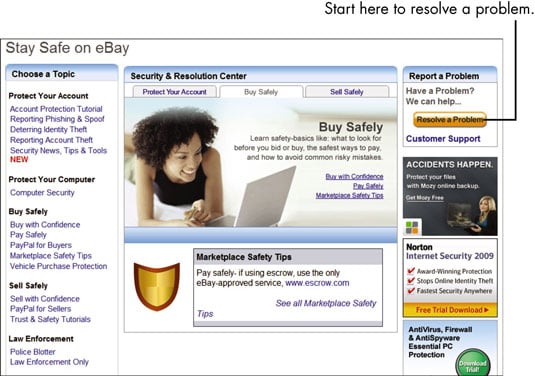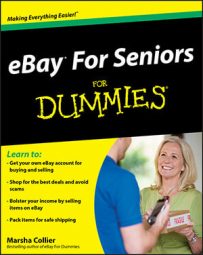You can help eBay be a watchdog. As a member of the eBay community, you can — and should — report bidding and selling abuses to the eBay staffers at the Security & Resolution Center. The Security Center is where eBay’s Trust and Safety gurus focus on protecting the Web site from members who aren’t playing by the rules. Through this department, eBay issues warnings and policy changes — and in some cases, evictions.
You can find eBay’s Security & Resolution Center by clicking the Security Center link at the bottom of most eBay pages. Trust and Safety’s Security & Resolution Center page also connects you with a group of eBay staffers who handle complaints, field incoming tips about possible infractions, investigate infractions, and dole out warnings and suspensions via e-mail in response to the tips. eBay staffers look at complaints on a case-by-case basis, in the order they receive them.

If you’re on eBay long enough, you’re bound to run across an abuse of the service. It may happen on an auction you’re bidding on, or it may be one of the sellers whose auctions compete with yours. Be a good community member and be on the lookout for the following:
Shill bidding: A seller uses multiple user IDs to place bids or has accomplices place bids to boost the price of his auction items. eBay investigators look for six telltale signs, including a single bidder putting in a really high bid, a bidder with really low feedback but a really high number of bids on items, a bidder with low feedback who has been an eBay member for a while but who’s never won an auction, or excessive bids between two users.
Auction interception: An unscrupulous user, pretending to be the actual seller, contacts the winner to set up terms of payment and shipping in an effort to make off with the buyer’s payment. This violation can be easily avoided by always paying with PayPal directly through the eBay site.
Fee avoidance: A user reports a lower-than-actual final price or illegally submits a Final Value Fee credit.
Bid manipulation: A user, with the help of accomplices, enters dozens of phony bids to make the auction appear to have a lot of bidding action. Let the experts at eBay decide on this one; but you may wonder what’s up if loads of bids come in rapid succession but the price moves very little.
Bid shielding: Two users work in tandem. User A, with the help of accomplices, intentionally bids an unreasonably high amount and then retracts the bid prior to the last 12 hours of an auction — leaving a lower bid (which the offender or an accomplice places) as the possible winning bid.
Bid manipulation (or invalid bid retraction): A user bids a ridiculously high amount, raising the next highest bidder to his or her maximum bid. The manipulator then retracts the bid and rebids slightly over the previous high bidder’s maximum.
Unpaid item (nonpaying bidder): These people win auctions but don’t pay.
Unwelcome bidder: A user bids on a specific seller’s auction despite the seller’s warning that he won’t accept that user’s bid (as when a seller who has a no-international-sales policy receives international bids anyway). This practice is impolite and obnoxious. If you want to ban specific bidders from your auctions, you can exclude them in your My eBay area links.
All you have at eBay is your reputation, and that reputation is made up of your feedback history. eBay takes any violation of its feedback system seriously. Because eBay’s feedback is transaction-related, unscrupulous eBay members can no longer manipulate the system. Here’s a checklist of feedback abuses that you should report to Trust and Safety:
Feedback extortion: A member threatens to post negative feedback if another eBay member doesn’t follow through on some unwarranted demand.
Personal exposure: A member leaves feedback for a user that exposes personal information that doesn’t relate to transactions on eBay.
–4 feedback: Any user reaching a net feedback score of –4 is subject to suspension.
Before you even consider reporting someone who gave you negative feedback to Trust and Safety, make sure that what you’re encountering is actually a misuse of eBay. Some behavior isn’t nice, but it also isn’t a violation of eBay rules — in which case, eBay can’t do much about it. Stick with the primary reasons when you start a Trust and Safety investigation.
Who you are on eBay is as important as what you sell (or buy). eBay monitors the identities of its members closely — and asks that you report any great pretenders in this area to Trust and Safety. Here’s a checklist of identity abuses:
Identity misrepresentation: A user claims to be an eBay staff member or another eBay user, or registers under the name of another user.
False or missing contact information: A user deliberately registers with false contact information or an invalid e-mail address.
Underage: A user falsely claims to be 18 or older. (You must be at least 18 to enter into a legally binding contract.)
Dead or invalid e-mail address: When e-mails bounce repeatedly from a user’s registered e-mail address, chances are good that the address is dead. Usually returned e-mail indicates that the address is unknown.
Contact information: One user publishes another user’s contact information on the eBay site.
If you see someone trying to interfere with eBay’s operation, eBay staffers want you to tell them about it. Here are two operational abuses:
Hacking: A user purposely interferes with eBay’s computer operations (for example, by breaking into eBay’s unauthorized files).
Spamming: The user sends unsolicited commercial e-mail to eBay users.
The following are additional problems that you should alert eBay about:
A user is threatening physical harm to another eBay member.
A person uses racist, obscene, or harassing language in a public area of eBay.
Click the report item link on an item page or click the Resolution Center link on the bottom of all pages to report violators to eBay. For a complete list of offenses and how eBay runs each investigation, visit eBay's "inappropriate buying and selling" Help page.

